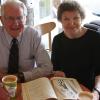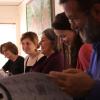Clint Talbott
 The man who discovered that playing in the dirt might ease depression is probing the link between higher temperatures and elevated mood.
The man who discovered that playing in the dirt might ease depression is probing the link between higher temperatures and elevated mood. African Americans and single mothers with young children compose a disproportionate share of the population living in the most polluted neighborhoods in America, a CU sociologist has found.
African Americans and single mothers with young children compose a disproportionate share of the population living in the most polluted neighborhoods in America, a CU sociologist has found. Ruth and Ken Wright have a long history of professional success. The pair also has an abiding passion for the poetry of Shakespeare. Their work and personal interests are as complementary as they are to each other.Ruth is an attorney who spent years
Ruth and Ken Wright have a long history of professional success. The pair also has an abiding passion for the poetry of Shakespeare. Their work and personal interests are as complementary as they are to each other.Ruth is an attorney who spent years James Balog vividly illustrates the rapid retreat of ice sheets and glaciers on Earth. His work, which has appeared on the cover of National Geographic and on PBS, turns climate-change skeptics into believers, he says.Balog’s time-lapse photography
James Balog vividly illustrates the rapid retreat of ice sheets and glaciers on Earth. His work, which has appeared on the cover of National Geographic and on PBS, turns climate-change skeptics into believers, he says.Balog’s time-lapse photography As the rubble of the World Trade Center in New York was still smoldering, President George W. Bush told the nation that the terrorists came from a small group of religious extremists who “hate our freedoms.” That extremism, he said, “perverts the
As the rubble of the World Trade Center in New York was still smoldering, President George W. Bush told the nation that the terrorists came from a small group of religious extremists who “hate our freedoms.” That extremism, he said, “perverts the For Shakespeare festival, where there’s a Will, there’s a way, new leader hopesThe Colorado Shakespeare Festival’s credentials run deep and wide. In 1975, for instance, it became the first American Shakespeare company to perform all 37 plays of the
For Shakespeare festival, where there’s a Will, there’s a way, new leader hopesThe Colorado Shakespeare Festival’s credentials run deep and wide. In 1975, for instance, it became the first American Shakespeare company to perform all 37 plays of the CU experts note positives, negatives and a plethora of pitfallsJust after the election of Barack Obama as the 44th president of the United States, a wry newspaper headline announced, “Black Man Given Nation’s Worst Job.”“America’s Finest News Source
CU experts note positives, negatives and a plethora of pitfallsJust after the election of Barack Obama as the 44th president of the United States, a wry newspaper headline announced, “Black Man Given Nation’s Worst Job.”“America’s Finest News Source Nicole Gibson’s grandparents set aside money for her college. She’s keenly aware of her good fortune. Now she’s paying it forward.Gibson is a 2004 environmental-studies graduate of the University of Colorado who began funding a scholarship in 2005.
Nicole Gibson’s grandparents set aside money for her college. She’s keenly aware of her good fortune. Now she’s paying it forward.Gibson is a 2004 environmental-studies graduate of the University of Colorado who began funding a scholarship in 2005. With a lot of help from Jane Butcher and many othersJane Butcher (center) works with students and staff to prepare for the 61st annual Conference on World Affairs. The conference begins April 6th, and is comprised of more than 200 sessions.In 1963,
With a lot of help from Jane Butcher and many othersJane Butcher (center) works with students and staff to prepare for the 61st annual Conference on World Affairs. The conference begins April 6th, and is comprised of more than 200 sessions.In 1963,


